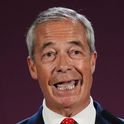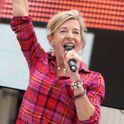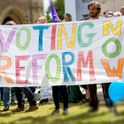“Oh, I was as surprised as everyone else.” That’s how veteran psephologist David Butler, now 92, responded when I asked him about last Thursday’s shock election result.
“A lot of the rules of the game that I thought I'd learnt over 70 years of working in this field have been falsified in the last few years," he said. "I can certainly say that it is a different world."
Butler, who ranks among the country's most respected number crunchers, presented the BBC’s election night coverage from 1950 to 1979 and co-invented the legendary "Swingometer," a graphics device used ever since. The author of more than 30 books on politics, he came back to national attention in the run-up to 8th June when he made a Twitter account and began tweeting analysis of elections past. I called him up hoping to pick the brains of an all-time great—and to try to understand just how strange our political times are.
At 10pm on Thursday, when the BBC published its exit poll, there was a national intake of breath. Contrary to the previous polling averages—not to mention all conventional wisdom—it put the Tories on just 314 seats, down from the 331 David Cameron won in 2015 and not enough for an outright majority. Labour had dramatically exceeded expectations, and was predicted to gain around 30 seats, winning 266 in total. (The final result has the Tories on 318 seats, Labour on 262, with the SNP down to 35 and the Liberal Democrats up to 12.)
I asked Butler, who in his time analysed plenty of exit polls on live TV, whether he could believe his eyes. But Butler tells me he immediately trusted the numbers. The poll "was delivered by John Curtice, a former pupil of mine at Oxford whom I greatly admired. I knew he wouldn’t be saying anything silly, and it came out extraordinarily right.”
Yet if the accuracy of the exit poll wasn't a surprise, the national picture it painted, and which has become clearer in the wake of the result, certainly was.
Astonishingly, given his advancing years, Butler told me he had since polling day been "playing around with the numbers." In this election, he says, swing from one party to another "was much more diverse than before, with more seats going in opposite directions—even adjacent constituencies having very different results to one another.” His words will be of great interest to today’s psephologists. "In the past you would find that in most elections, 90 per cent of constituencies had a swing that was within 2 per cent of the national average." No longer; the variation last week from one constituency to another—one region to another—was striking.
The final result, Butler says, means that the government will be "very unstable." Subsequently, the prospect of yet another snap election will be "hanging over us all the time,” he suggests. “When will it come? How will it come? I think it’ll be very difficult to get a really stable, relaxed administration when the government is going to depend on another party’s support,” he concludes, referencing the fact that the Tories have had to strike a deal with the DUP to achieve a working majority.
But even this patchy arrangement leaves the PM with very little wiggle room on Brexit, since it gives her only a very slim majority. Does Butler think Thursday's result will change the type of Brexit Britain embarks upon? He paused, considering the evidence, and then replied: “I would have thought it was bound to.”
https://twitter.com/SirDavidButler/status/872981170811744256
The consensus now is that May is fatally wounded, and will be replaced by her party before long. Corbyn, in contrast, can “come back in much better form, and can obviously have a great deal of heart. He is secure for quite a while now in his leadership," said Butler.
While very few people predicted a hung parliament, it was clear in the run-up to 8th June that something unusual was afoot. Corbyn was rapidly gaining ground. “We knew before any results were in that there had been more movement in opinion during the election than any previous election had shown evidence of,” Butler explained, drawing on that great well of expertise.
He also has a theory as to why. "The Conservatives didn’t fight a very efficient campaign and they seemed complacent—then flustered towards the end when things started going wrong."
While a few pollsters picked up just how close things were, Butler is certain the industry will be undertaking a full post-mortem.
“After all, there was a very wide spread of opinion polls. The last time the polls here were seriously wrong was 1992, when all of them agreed on a labour lead of 6-8 per cent, and in fact the Conservatives won by about 3 or 4 per cent. But then, all the polls went wrong together. This time, they’ve gone wrong differently.”
https://twitter.com/SirDavidButler/status/873090974137802753
One explanation given for the divergence in opinion polls—and in the predictions of the commentariat more broadly—has centred on youth turnout. Those who anticipated high youth turnout and accounted for it in their prediction have been vindicated; those who didn't have not. The number of young people who turned out last week was, Butler said, a “surprise.” But it “was lower than any youth turnout from 1950 to 1997” He continued: "We had over 70 per cent in every election for the bulk of my lifetime.”
Before he signs off, we have a quick chat about his foray into the Twittersphere, where his insights have delighted watchers of politics. His follower count stands at more than 16,000. “I was not experienced with Twitter at all before,” Butler says. “My sons persuaded me to get it.” Will he keep at it now polling day has passed? “It’s not what I want to spend my 90s doing,” he replies—worryingly for those who have come to look forward to reading his election trivia.
But I imagine we have not heard the last from David Butler. If another general election is called, I suspect he will struggle to keep away. His final tweet of this campaign suggests as much: "Learning to tweet at 92 has been fun. But my musings should now be confined to elections, so I am signing off..." he begins, before ending on a rather more upbeat note:
"Until next year?"
David Butler: The rules of the political game have been falsified
The psephology great on last Thursday's staggering result, the prospect of yet another election, and his foray into the Twittersphere
June 13, 2017

David Butler prepares to present the BBC's 1959 election coverage. Photo: Barratts/S&G Barratts/EMPICS Archive












